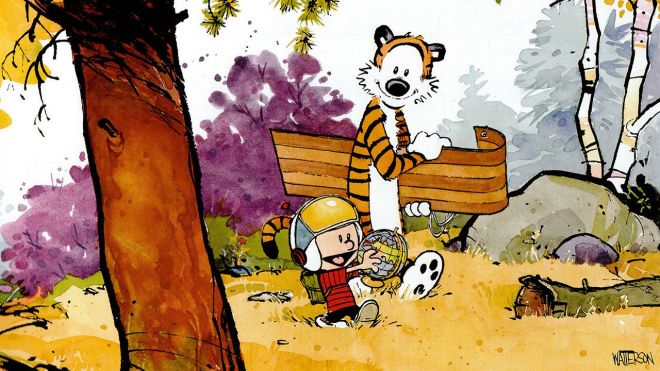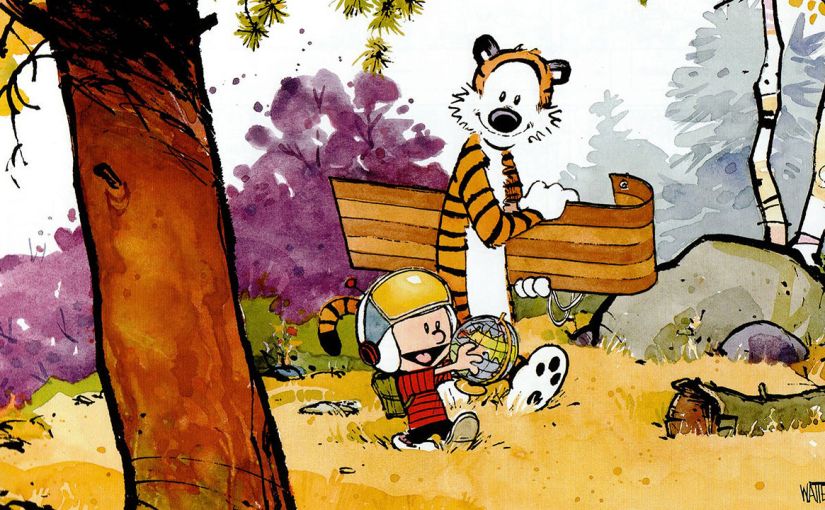
_____________________
“I’ve been thinking, Hobbes”
“On a weekend?”
“Well, it wasn’t on purpose.”
_____________________
Where to begin?
Let’s start on a sunny day in 1999 in a large house that rests a few miles southwest of Fort Knox. I am five years old and my brother, Ezekiel, is almost one year old. On this day, amidst preparations to head out with my parents and my new brother, I stumble upon an unfamiliar comic book. Its cover depicts a young boy mid-air wearing roller skates and holding an open umbrella, the boy connected by rope to a red wagon that has just recently been sent careening off of a small dock into a pond. There is a cartoon tiger mid-air inches above the red wagon also suspended above the water; the boy overjoyed, the tiger apprehensive. Red letters spell out “Calvin and Hobbes”, a collection of Sunday strip comics by Bill Watterson. I ask my mother if I can borrow her book. She replies that “she did not find it that funny,” but, “sure.”
Now, let’s jump up on that sunny day in 1999 and land on the ground in 2016. Calvin and Hobbes has proven to be perhaps the most triumphant celebration of life, youth, imagination, sense, wit, and satire that I have had the pleasure of experiencing in my entire life. In fact, there is no other book, piece of music, movie, or other creative work that has influenced me the way Calvin and Hobbes has. I continue to read the collections I own, as they always take on a new meaning in the context of my life at that time. Notably, I spent the Spring break of my freshman year of college reading Calvin and Hobbes. The constant whir of college life had taken a toll on my imagination and sense of creativity. Not only a toll on my ability to create, but my ideas towards how worthwhile it was to create, in general, had also been damaged. It was Watterson who reminded me that a life spent not creating is like a dreamless sleep: empty and fleeting.
The comic follows a young boy, Calvin, and his best friend, a tiger named Hobbes. To Calvin, Hobbes is alive, to everyone else, Hobbes is a stuffed animal. Calvin creates whole worlds with his imagination, playing the roles of various superheroes, space explorers and sometimes dinosaurs. All of this imagination is in the context of life, in the sense that the real world is often a green screen of sorts for Calvin’s imagination.
I was able to grow up with Calvin, and I learned that the words Watterson wrote for a young boy would resonate throughout a lifetime. Even now, as I reminisce on some of my favorite strips online, I recall reading them when I was much younger, and how I felt then compared to how I feel now. One I just read involves Calvin and Hobbes finding a dead crow. Calvin says, “Look, a dead bird!” To which Hobbes replies, “It must’ve hit the window.” Calvin then goes on in the next few boxes to say, “Isn’t it beautiful? It’s so delicate. Sighh… Once it’s too late, you appreciate what a miracle life is. You realize that nature is ruthless and our existence is very fragile, temporary, and precious. But to go on with your daily affairs, you can’t really think about that. …Which is probably why everyone takes the world for granted and why we act so thoughtlessly. It’s very confusing… I suppose it will all make sense when we grow up.” Hobbes replies, “No doubt.” The next panel is Calvin and Hobbes sitting, leaned against a tree, while three birds fly past in the background. And, here I am, still waiting for it all to make sense.
I am eternally grateful to have read Calvin and Hobbes throughout my entire life, so that I may always have another connection to my past. I am a more thoughtful, compassionate, and peaceful person because of this comic strip.
